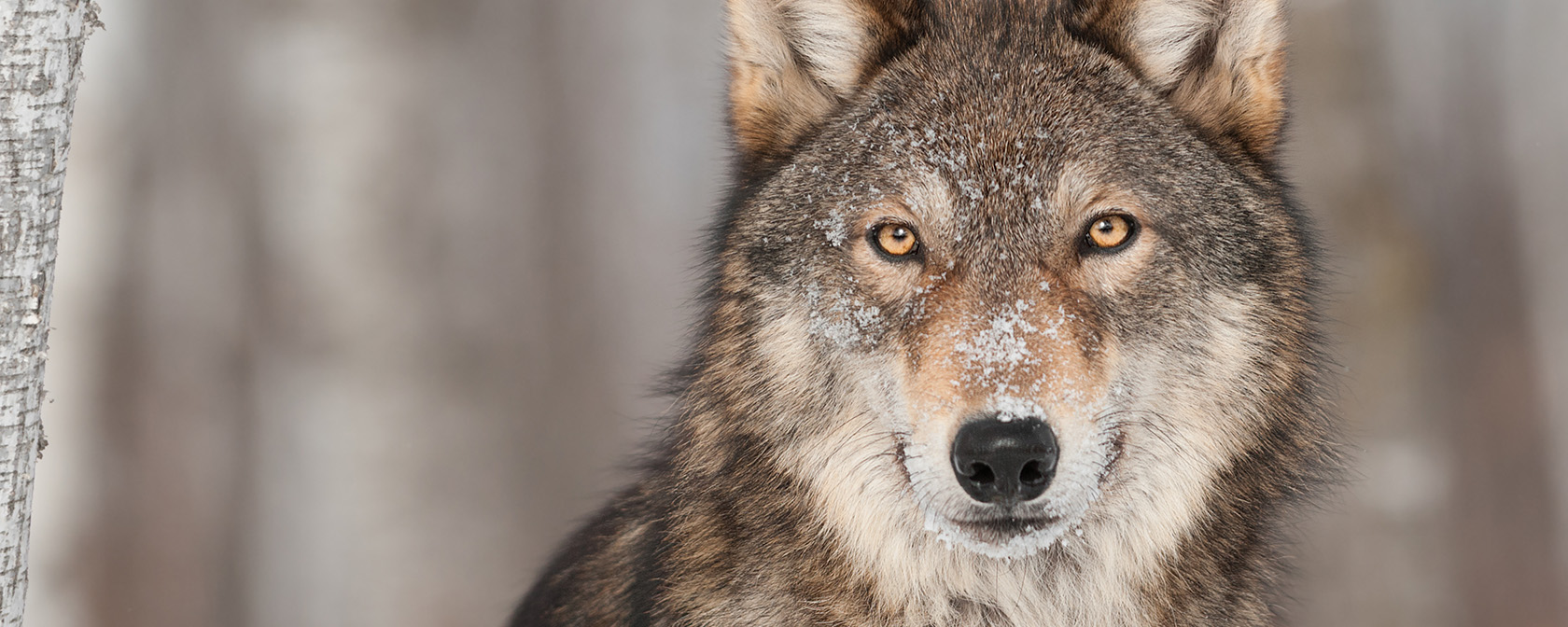By Sara Amundson and Kitty Block
Last week, reports surfaced that a man in Wyoming allegedly ran down a wolf with a snowmobile. He then reportedly taped the injured wolf’s mouth shut, paraded the helpless and terrified animal around at a local bar and posed for a photo with the injured wolf before going outside and killing the animal. According to news reports, the Wyoming Game and Fish Department cited the man only for possession of a live wild animal and levied a paltry $250 fine before washing its hands of the matter.
A mere slap on the wrist is unacceptable, and we’re calling on local authorities to prosecute this individual under state felony animal cruelty laws.
No animal should be forced to endure the extreme level of stress, fear and agony this wolf experienced. While the appalling events described in news reports about this incident are extreme—and they were brought to light only because of an anonymous tip—this incident serves as a glaring reminder that many wolves in Wyoming and throughout the Northern Rockies experience similar brutalities. About 85% of Wyoming is designated as a “predator zone,” where wolves can be killed in virtually any manner and number any time of the year. They are frequently run down with snowmobiles, ATVs and pickup trucks, gunned down from helicopters and airplanes, or suffer excruciating pain and death in steel-jawed leghold traps and strangling neck snares. And there are no bag limits, either—meaning trophy hunters and trappers can kill as many animals as they can find.
Every wolf killed by a trophy hunter or trapper is an intelligent individual, often with a rich social and family life. Wolf packs are families, consisting of parents, pups and older siblings who help take care of the young. Adult wolves have even been observed bringing sticks and other toys back to pups, sacrificing themselves to protect family members, and letting small pups win play fights. Due to their close, complex and interdependent social structure, killing a single wolf can have devastating and reverberating consequences for the whole pack. It can lead to the orphaning of pups, the abandonment of territory and the collapse of the family.
In Wyoming’s predator zone, entire wolf families—including pups—can be killed in their dens. The same is true in Idaho. Wolves in the West—and the Great Lakes states, when they can be legally hunted and trapped—are also often killed using night vision equipment, packs of dogs, bait and electronic calls that mimic prey animals or young in distress. Bounty-like payments are made in Idaho and Montana for dead wolves. Wolves caught in traps and snares in Montana, Idaho and Wyoming are left to struggle against the brutal device for hours or days before the trapper returns to kill them. The brutality many wolves face is overwhelming.
Such killing practices are not traditional, subsistence hunting methods. They are deliberate and heinous acts of cruelty. The fact that states allow such methods to kill wolves only feeds into the sentiments of many trophy hunters that wolves deserve no compassion or humane treatment. It may even increase poaching.
While it’s important to protect wolves and other wild animals for their sake and for the benefits they bring to our lives, our environment, and our economy, there are also serious public safety reasons to support increased protections. Violence does not exist in a vacuum—animal abusers can also abuse people. There is a correlation between committing acts of intentional cruelty to animals and committing violence against humans, and law enforcement is taking it seriously. The FBI is now tracking incidences of crimes against animals in addition to other serious crimes like murder, burglary and domestic abuse.
The outrage over the torment of this wolf demonstrates the overwhelming public support to protect wolves from the persecution they endure under state management each year. We are working closely with our allies on the ground in Wyoming to see justice done here and seek stronger protections for all wolves.
This incident and the ongoing war on wolves is why we are fighting for federal protections for wolves in the Northern Rockies in court. Reckless state management isn’t only cruel, it threatens the viability of the wolf population in the region. Protection under the Endangered Species Act would take jurisdiction for managing wolves out of the hands of the Northern Rockies states that have proven to be mercilessly intent on exposing them to all kinds of cruelty.
You can call upon the Wyoming Office of Tourism to demand changes to Wyoming’s draconian, backward laws as well as state policies targeting wolves. State lawmakers must protect animals, including Wyoming’s native wildlife, not only from wanton acts of cruelty but from reckless public policy that allows cruel killing methods to continue.
Kitty Block is CEO of the Humane Society of the United States.




